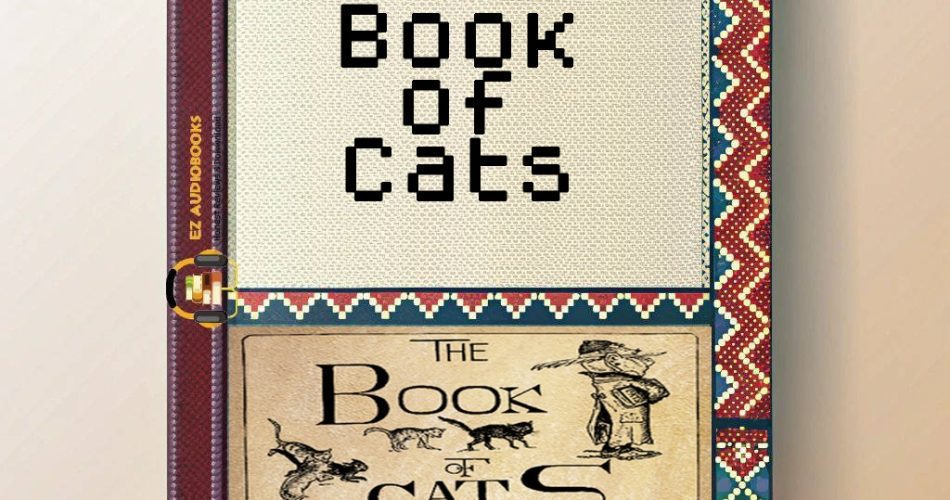Audiobook Sample
Listen to the sample to experience the story.
Please wait while we verify your browser...
- Title: Book of Cats
- Author: Charles Henry Ross
- Narrator: LibriVox Volunteers
- Length: 05:12:10
- Version: Abridged
- Release Date: 01/01/2016
- Publisher: LibriVox
- Genre: Non-Fiction, Science & Technology, Animals & Nature
- ISBN13: SABLIB9781232
There’s something profoundly intimate about listening to Victorian animal literature while curled up with a living, breathing cat. That’s exactly how I experienced Charles Henry Ross’s ‘Book of Cats’ – with my rescue tabby, Pancho, purring contentedly on my lap as LibriVox’s volunteer narrators transported us back to 19th-century England. This free audiobook offers more than just historical cat trivia; it’s a time capsule of human-feline relationships that made me reflect deeply on how we’ve loved and misunderstood these creatures across centuries.
The moment the first narrator began reading Ross’s self-deprecating introduction about his abandoned ‘Book of Donkies,’ I was charmed. His voice carried that particular British inflection I’ve come to associate with elderly gentlemen in tweed jackets – the kind I met while researching a story about London’s last traditional pet shop keepers. The multiple narrator approach (a hallmark of LibriVox productions) creates an effect rather like sitting in a Victorian parlour where different family members take turns sharing cat stories. While this means occasional inconsistencies in audio quality and pronunciation, it adds authentic period flavor – much like the crackle of an old recording.
Ross’s work unfolds as a delightful cabinet of feline curiosities. One chapter might detail practical advice for curing a cat’s cold (involving alarming amounts of brandy), while the next shares anecdotes about church cats who disrupted sermons. Listening while sipping mint tea in my Mexico City apartment, I was particularly struck by the story of a ship’s cat who predicted storms – it reminded me of fishermen in Veracruz who still believe cats can sense hurricanes. The book’s blend of superstition and proto-scientific observation reveals how Victorians navigated their growing interest in natural history while clinging to folk wisdom.
The narration truly shines in sections describing cat behavior. When one volunteer reads about a mother cat moving her kittens, her voice drops to a whisper, creating the same hushed reverence I’ve heard from indigenous storytellers describing animal spirits. Another narrator delivers Ross’s dry humor about ‘useless Persian cats’ with perfect timing, echoing the wry tone my Oaxacan host grandmother used when complaining about her spoiled courtyard cats. These human touches transform what could be dry material into something warm and immediate.
Modern listeners should approach this as both entertainment and historical artifact. Some passages reflect Victorian biases (the casual cruelty towards ‘working cats’ made Pancho flick his ears disapprovingly), while others show surprising empathy. A chapter on ‘cat morality debates’ – questioning whether cats feel gratitude – anticipates contemporary animal cognition studies. The audio format makes these philosophical sections particularly engaging; hearing the narrators wrestle with Ross’s rhetorical questions feels like overhearing a lively 19th-century dinner debate.
Compared to Harrison Weir’s more scientific ‘Our Cats,’ Ross’s work feels like chatting with an eccentric uncle who collects odd cat stories. The LibriVox production enhances this quality – occasional background noises (a chair creaking, pages turning) create intimacy rather than distraction. It’s far removed from polished studio recordings, but that’s its charm. Like the cats it describes, this audiobook is imperfect, unpredictable, and utterly endearing.
For travelers and cat lovers, I’d recommend pairing this listen with a visit to London’s Cat Museum or Rome’s Torre Argentina cat sanctuary. Hearing Ross describe Victorian cat shows while watching modern Bengalis preen at a cat café creates fascinating cultural continuity. The book also offers wonderful writing prompts – after the chapter on theatrical cats, I wrote three pages about a circus-performing cat I’d met in Budapest.
While not a comprehensive guide (don’t trust the veterinary advice!), this audiobook succeeds as what Ross intended: a celebration of feline mystery. As Pancho would say (if he could speak English rather than his peculiar mix of Spanish and purrs), it’s a ‘must-listen’ for anyone who’s ever been owned by a cat.
With one hand petting a cat and the other holding a pen,
Marcus Rivera

